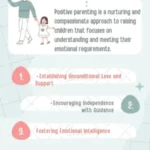Navigating the realm of parenting is a journey marked by challenges and triumphs. One approach that has garnered significant attention and praise is positive parenting. In this article, we’ll explore the five fundamental skills that contribute to the art of positive parenting, recognizing their profound impact on a child’s development.
Effective Communication
At the heart of positive parenting lies the skill of effective communication. This involves establishing an open dialogue with your child, creating an environment where they feel comfortable expressing their thoughts and feelings. Active listening, a crucial component, ensures that your child feels heard and understood.
Encouraging Independence
Positive parenting emphasizes encouraging independence in children. This involves fostering autonomy while providing guidance. Striking a balance between allowing your child to make choices and offering necessary guidance promotes a sense of self-confidence and responsibility.
Setting Clear and Consistent Boundaries
A cornerstone of positive parenting is the establishment of clear and consistent boundaries. Rules should be set with explanations, and consistency in enforcement is vital. This approach helps children understand the consequences of their actions and promotes a structured and secure environment.
Positive Reinforcement
Positive reinforcement is a powerful tool in positive parenting. By rewarding good behavior, parents reinforce positive actions, building a strong and trusting relationship with their child. This approach focuses on encouragement rather than solely addressing negative behaviors.
Emotional Coaching
Emotional intelligence is a crucial aspect of positive parenting. Emotional coaching involves helping children understand and manage their emotions. By teaching healthy ways to express feelings, parents contribute to the emotional well-being of their children.
Modeling Behavior
Parents are the primary role models for their children. Modeling behavior entails leading by example, demonstrating the values and virtues parents wish to instill in their children. Children often learn by observing, making parental actions a powerful influence.
Problem-Solving Skills
Positive parenting encourages the development of problem-solving skills in children. This involves fostering critical thinking and teaching effective techniques for addressing challenges. Empowering children to navigate problems contributes to their independence and resilience.
Flexibility and Adaptability
Parenting is dynamic, requiring flexibility and adaptability. Positive parenting involves adjusting approaches to individual needs and handling unexpected challenges with grace. This adaptability creates an environment of understanding and support.
Nurturing Self-Esteem
Building a positive self-image is integral to positive parenting. Nurturing self-esteem involves recognizing and appreciating a child’s strengths, fostering a healthy sense of self-worth, and encouraging a growth mindset.
Consistent Affection and Support
Consistent demonstration of affection and support is a foundational aspect of positive parenting. Expressing love and support consistently creates a secure emotional foundation for children, influencing their overall well-being.
Empathy and Understanding
Cultivating empathy and understanding is central to positive parenting. This involves putting oneself in the child’s shoes, tailoring responses to individual needs, and creating a supportive and understanding environment.
Teaching Responsibility
Positive parenting includes teaching responsibility. This is achieved by assigning age-appropriate tasks and instilling a sense of accountability. In doing so, parents contribute to the development of a responsible and capable individual.
Balancing Discipline with Positivity
Effectively balancing discipline with positivity is a skill in positive parenting. This entails employing discipline strategies that are both effective and nurturing, maintaining a positive and encouraging home environment.
Conclusion
In conclusion, mastering the art of positive parenting involves cultivating and honing these five essential skills. Effective communication, encouraging independence, setting clear boundaries, positive reinforcement, and emotional coaching form the foundation of a positive parent-child relationship. The journey of positive parenting is ongoing, adapting to the evolving needs of both parents and children.
Frequently Asked Questions (FAQs)
- Can I start positive parenting at any stage of my child’s life?
- Yes, positive parenting principles can be applied at any stage, fostering a positive relationship with your child.
- How can I balance discipline without being too strict or too lenient?
- Find a balance by setting clear expectations, explaining consequences, and maintaining open communication with your child.
- What if my child seems resistant to positive reinforcement?
- Explore different forms of positive reinforcement and tailor them to your child’s interests and preferences.
- Is positive parenting effective for all children, including those with special needs?
- Yes, positive parenting principles are adaptable and effective for children with various needs, emphasizing a supportive and nurturing approach.
- How can I encourage emotional expression in my child without overwhelming them?
- Create a safe space for your child to express emotions, and be available to discuss feelings without judgment.
Read also : Positive Parenting Techniques 101: A Comprehensive Guide to Transform Your Effective Parenting Journey





